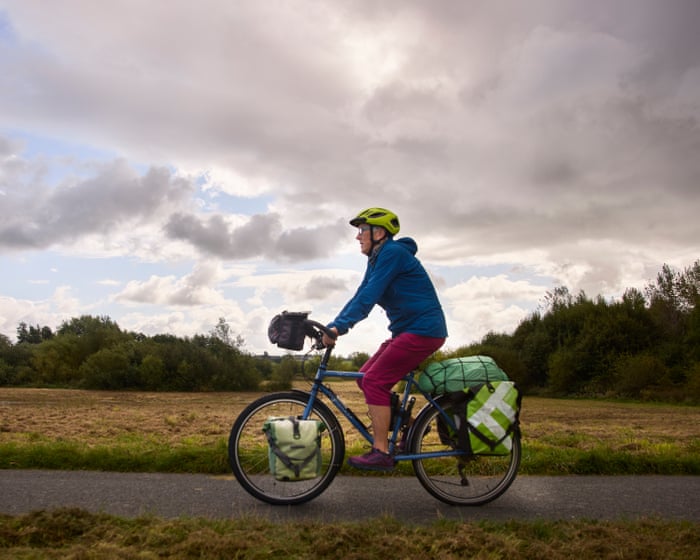When Sarah Cook could no longer resist the urge, she bought a touring bike and a versatile four-season tent, then packed her life into 68-liter bike bags. At 60, after renting out her flat in Cumbria, England, she set off alone to cycle the Pacific coast of the US. As she pedaled away from Vancouver airport, she recalls thinking, “See you in six months!” She found it incredibly freeing to leave behind the weight of a house and possessions. After 111 days, arriving in La Paz, Bolivia, she realized, “This is how I want to live my life.” Now 67, she has been traveling ever since, covering 24,000 miles by bike.
Cook wanted to discover what happens when life is on the road, believing that something must shift in your mind or emotions—it’s the ultimate way to live in the moment. Each day as she starts pedaling, she says, “I feel weightless—as if I’m flying.”
Some of her memorable journeys include cycling nearly 3,000 miles across Europe from the Black Sea to the Atlantic, camping under giant sequoias in California, wild camping in Colombia’s páramo, and fulfilling a childhood dream by pedaling 2,000 miles along Patagonia’s coast to Ushuaia in Argentina.
Growing up in a Surrey village, Cook used to trace explorers’ routes on greaseproof paper from her parents’ world atlas. As the eldest of six, she would lead her siblings into the garden with tea ingredients, lift a piece of turf with her penknife, and build a campfire.
She studied medical sciences in university and worked in a hospital hematology lab but paused her career to homeschool her three daughters and son. In her 40s, she began questioning her life, wondering what she had accomplished beyond raising children, feeling that her potential was underused. When her kids went to university, she asked herself, “What do I do now? Who values homeschooling as personal growth?”
She trained as a mountain leader and to teach English as a foreign language, then worked part-time leading walking holidays, teen expeditions, and teaching English. Financial independence was important after separating from her husband.
Although Cook returns to England regularly to see family, she has no permanent home, staying in rentals or campsites. Between tenants, she has even slept in her sleeping bag on her flat’s carpet. “It’s not my home now,” she says, “though home is wherever I am.”
She feels settled even for just one night, with everything in her tent having its place. She marvels at how a simple piece of fabric can feel like home.
Cycling and a nomadic life have given Cook confidence that she can handle almost anything. She lives by two mantras: “It’ll work out” and “Just do the next thing.” When overwhelmed, she focuses on the next small step, like eating a banana.
Despite osteoarthritis in one hip and the physical challenges of cycling, such as pushing her bike uphill for five hours in Colombia, she accepts that her body needs more rest but has no plans to stop. Recently in the UK, she toured southern England and cycled from the Shetlands to Cornwall’s southern tip.
She remembers a grey, damp morning in Scotland, with low clouds and screeching gulls, wondering why she felt so ecstatically happy setting off on her bike. The truth, she says, is that as soon as she starts pedaling, her spirit soars.Has your life taken a new direction since you turned 60?
Frequently Asked Questions
Of course Here is a list of helpful and natural FAQs about starting a new nomadic life after 60
FAQs Starting a Nomadic Life After 60
Beginner Definition Questions
1 What does this lifestyle actually look like daytoday
Its a life of simplicity and freedom Your day is dictated by the sun and the road You might spend your morning packing your tent cycling to a new town finding a safe place to camp for the night cooking a simple meal and falling asleep under the stars
2 Isnt it just being homeless Whats the difference
The key difference is choice and security This is a voluntary planned lifestyle funded by renting out your previous home Its about minimalism and adventure not a lack of options or resources
3 How do you afford to live like this
The primary source of income is often from renting out a previously owned home or apartment This provides a steady passive income stream to cover basic living expenses food and bike maintenance
Benefits Motivation
4 What are the biggest benefits of starting this life after 60
The benefits include incredible freedom daily physical activity a deep connection with nature a simplified life with fewer possessions and the mental challenge of constantly learning and adapting
5 Why would someone do this at this stage of life
Many people reach a point where they want to break from routine seek new adventures before its too late and live for experiences rather than material things Its a powerful way to redefine retirement
Practicalities Common Problems
6 Where do you sleep and shower
You sleep in a tent at campgrounds national parks or sometimes in more discreet wild camping spots Showers are found at campgrounds truck stops gym memberships or public swimming pools
7 What about your mail and important documents
You can use a mail forwarding service that scans and emails you your important mail or have it sent to a trusted friend or family members address Important documents are kept digitally or in a small secure folder
8 Dont you get lonely
It can be lonely at times but the lifestyle also forces you to be more outgoing You meet other cyclists hikers and friendly people in small towns Many also stay connected with



